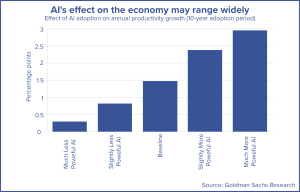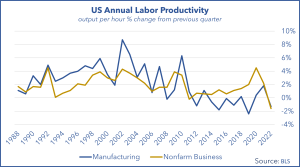Nelson Capital Management


Click here for a glossary of key AI terms.
The term “artificial intelligence” was first coined in 1956 at a conference called Dartmouth Summer Research Project on Artificial Intelligence, hosted by John McCarthy and Marvin Minsky. This pivotal discussion amongst top researchers on the viability of AI was the initial catalyst for early AI research. Over the past several decades, we have seen several periods where new developments in AI have fueled optimism that quickly fizzled, so what makes this time different?
 The latest bout of AI euphoria was precipitated by OpenAI’s launch of ChatGPT in November of 2022, unveiling the possibilities of generative AI and large language models (LLMs). Though ChatGPT’s far from perfect—as its management team acknowledged—it sparked excitement over the potential impacts that AI could have on our society. Since then, AI-related stocks have skyrocketed with Nvidia (tkr: NVDA), the primary chip maker behind the AI technology, seeing triple-digit growth so far this year. The number of companies in the S&P 500 mentioning AI in their Q1 2023 earnings call surged to a record 110, over double from just three years ago and exponentially higher than the two companies mentioning AI in earnings calls ten years ago. According to a survey by Accenture, 98% of global executives agreed AI foundation models will play an important role in their organizations’ strategies in the next 3 to 5 years. Accenture even makes the claim that advances in language-based AI (like ChatGPT) are ushering in a new era for total enterprise reinvention.
The latest bout of AI euphoria was precipitated by OpenAI’s launch of ChatGPT in November of 2022, unveiling the possibilities of generative AI and large language models (LLMs). Though ChatGPT’s far from perfect—as its management team acknowledged—it sparked excitement over the potential impacts that AI could have on our society. Since then, AI-related stocks have skyrocketed with Nvidia (tkr: NVDA), the primary chip maker behind the AI technology, seeing triple-digit growth so far this year. The number of companies in the S&P 500 mentioning AI in their Q1 2023 earnings call surged to a record 110, over double from just three years ago and exponentially higher than the two companies mentioning AI in earnings calls ten years ago. According to a survey by Accenture, 98% of global executives agreed AI foundation models will play an important role in their organizations’ strategies in the next 3 to 5 years. Accenture even makes the claim that advances in language-based AI (like ChatGPT) are ushering in a new era for total enterprise reinvention.
As AI continues to dominate the headlines, you may be wondering: How much of this hype is driven by companies simply rebranding or making minor improvements to existing products and services, and how much is driven by real technological advancements that will translate to increased profitability, productivity, and efficiency in the global economy. A research piece published by McKinsey on AI’s impact on productivity estimates that “generative AI could add the equivalent of $2.6 trillion to $4.4 trillion annually across the 63 use cases analyzed…This estimate would roughly double if we include the impact of embedding generative AI into software that is currently used for other tasks beyond those use cases.” McKinsey’s productivity estimate is similar to that published in a PWC report that projects AI technologies may contribute up to $15.7 trillion to the global economy by 2030. As evidenced by the chart below, Goldman Sachs estimates that AI could impact annual productivity growth by a quarter of a percentage point to about three percentage points depending on how quickly the technology is developed and adopted over a ten-year period.


While the magnitude and timing of AI’s impact on global economies remains incredibly difficult to parse currently, what we do know is generative AI has the potential to transform the way people work across nearly every industry. Generative AI is more influential across certain business functions and industries. Customer operations, marketing and sales, software engineering and R&D are all business functions that are poised to benefit most as generative AI could support customer interactions, create marketing content, write code, and more. The industries most likely to be impacted by generative AI include banking, technology, retail and consumer packaged goods, and life sciences. Banks could see optimization in the migration of legacy frameworks and automate or enhance the resolution rate for customer emergencies. Pharmaceutical companies could benefit from an acceleration in research and drug discovery and drafting medication instructions and risk notices. Retail and consumer packaged goods companies could profit from strengthened consumer research including the use of “synthetic customers”, data analytics regarding the status of consumer preferences as well as enhanced procurement negotiations with suppliers.
While AI has demonstrable benefits, much of the technology is still in its infancy. Companies are working diligently to work out the kinks such as “hallucinations,” which occur when the AI system provides answers that are factually incorrect or nonsensical. Many also have concerns regarding the use of AI in educational environments where this technology could enable students to plagiarize work by having tools like ChatGPT write essays, solve homework and create presentations. Arguably the most critical drawback is the substantial legal hurdles that companies using generative AI face, particularly around copyright and intellectual property laws. Who owns the content generated by these AI models? How can that content be used and/or distributed? Who is responsible for any copyright infringement in the content that AI generates? Lawmakers are working assiduously to set laws in place that answer these questions as litigation on these matters remains pervasive.
Individual investment positions detailed in this post should not be construed as a recommendation to purchase or sell the security. Past performance is not necessarily a guide to future performance. There are risks involved in investing, including possible loss of principal. This information is provided for informational purposes only and does not constitute a recommendation for any investment strategy, security or product described herein. Employees and/or owners of Nelson Capital Management, LLC may have a position securities mentioned in this post. Please contact us for a complete list of portfolio holdings. For additional information please contact us at 650-322-4000.
Receive our next post in your inbox.